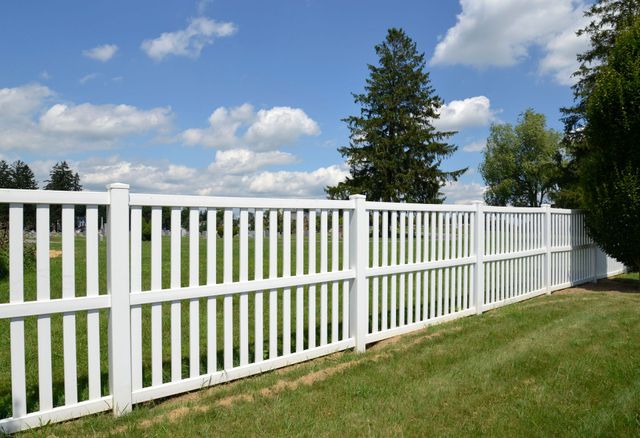All Categories
Featured
What Kinds of Fence Materials Are Offered for Residential and Commercial Projects?

When intending to install a fencing, picking the best material is crucial for fulfilling the aesthetic, useful, and budgetary requirements of your building. Whether for commercial or property use, contemporary secure fencing alternatives provide a variety of selections to match certain needs. Right here's a comprehensive look at the most common fence products readily available today.
- Wood Fencing. Timber is a classic option for homeowners seeking charm and versatility. It functions well for privacy fencings, ornamental styles, and limit marking.
Secret Advantages of Wood Fence:
Aesthetic Flexibility: Can be crafted into numerous styles, including board-on-board, latticework, and picket styles. Affordable: Offers price for numerous projects, especially smaller sized household ones. Customizable: Conveniently repainted or stained to match a home's outside. Downsides: Requires regular upkeep, such as sealing and tarnishing, to secure versus weathering and insects.
- Vinyl Fence. Vinyl fencing has actually expanded in popularity as a result of its sleek appearance and minimal maintenance needs. It's an excellent alternative for both commercial and residential spaces.
Advantages:
Durable and Resilient: Vinyl stands up to climate damage, pests, and fading. Easy Maintenance: A fast laundry with soap and water keeps it looking pristine. Trendy Alternatives: Can be found in several shades and structures, some imitating natural wood. Considerations: The initial cost is greater, but the long-term cost savings on upkeep can make it a wise financial investment.
- Chain-Link Secure fencing. Chain-link fence is a functional solution for safeguarding big areas, commonly made use of in business, commercial, and entertainment properties.
Benefits:
Affordability: One of one of the most affordable fencing alternatives. Sturdiness: Stands up to tear and use, also in difficult settings. Presence: Supplies a clear line of vision while maintaining security. Disadvantages: Minimal aesthetic charm and personal privacy unless integrated with slats or foliage.
- Light weight aluminum Fencing. Aluminum offers an innovative look without jeopardizing on durability. It's particularly popular for attractive or protection purposes.
Trick Features:
Rust-Free: Ideal for moist climates or swimming pool units. Reduced Maintenance: Needs very little upkeep contrasted to iron or wood. Classy Appearance: Often made use of to simulate wrought iron without the hefty cost. Factors to consider: Not as solid as steel, making it less suitable for high-security requirements.
- Wrought Iron Secure Fencing. Known for its classic beauty and longevity, wrought iron is a favorite for high end homes.

Benefits:
Stamina and Safety: Difficult to bend or damage, making it excellent for high-security applications. Customizable Layouts: Can be shaped into complex patterns for an one-of-a-kind appearance. Long life: With appropriate upkeep, functioned iron can last for years. Drawbacks: Calls for routine maintenance to prevent rust and is among the a lot more expensive fence alternatives.
- Compound Fence. Compound fences incorporate wood fibers and plastic for a resilient, environmentally friendly alternative.
Benefits:
Eco Pleasant: Typically made from recycled materials. Low Upkeep: Resistant to rot, pests, and bending. All-natural Appearance: Resembles the look of timber without the maintenance. Downsides: Greater upfront cost compared to standard wood secure fencing.
- Bamboo Fence. Bamboo is a sustainable and elegant selection, particularly for houses looking for an all-natural visual.
Advantages:
Eco-Friendly: Bamboo is eco-friendly and eco-friendly. Special Look: Adds a zen-inspired or tropical touch. Economical: Usually cheaper than woods. Disadvantages: Less durable in extreme environments or against long term exposure to moisture.
- Steel Secure fencing. Steel fencing uses unmatched toughness, making it a go-to choice for commercial and industrial needs.
Features:
Durable Toughness: Handles significant influences and climate obstacles. Customizable Coatings: Powder layer improves its appearance and durability. Safety: Suitable for locations needing enhanced protection. Factors to consider: Greater expense and weight make it much less suitable for small-scale projects.
- Stonework or Rock Fence. For buildings seeking a very sturdy and long-term masonry, option or rock secure fencing is a premium option.
Benefits:
Ultimate Durability: Withstands rough weather and lasts for decades. Soundproofing: Blocks noise, making it suitable for metropolitan locations. Deluxe Aesthetic: Supplies a high end appearance that matches high-end homes. Disadvantages: High installation costs and restricted versatility in design adjustments.
Just How to Choose the Right Material. When choosing a secure fencing material, consider the list below variables:
Objective: Do you need security, personal privacy, or decorative appeal? Spending plan: Some materials, like wood and chain-link, are affordable, while wrought iron and rock come with a costs. Upkeep: Products like plastic and light weight aluminum are less complicated to keep, while wood and wrought iron demand normal care. Environment: Some products, such as bamboo or unattended timber, are much less ideal for extreme weather conditions. Conclusion. Fence products today supply a broad range of choices to fit various spending plans, functions, and styles. Whether you focus on sturdiness, looks, or eco-friendliness, there's a product that will certainly fit your demands. By dealing with a specialist secure fencing professional, you can explore these choices thorough and ensure a perfect setup for your commercial or property job.
Latest Posts
Professional Residential Roof Solutions You Can Trust Fund
Published May 25, 25
1 min read
Picking the Right Roofing Shade: Influence On Energy Performance
Published May 24, 25
1 min read
Experience WyHy FCU – The Key to Smarter Finances in Wyoming
Published May 22, 25
1 min read